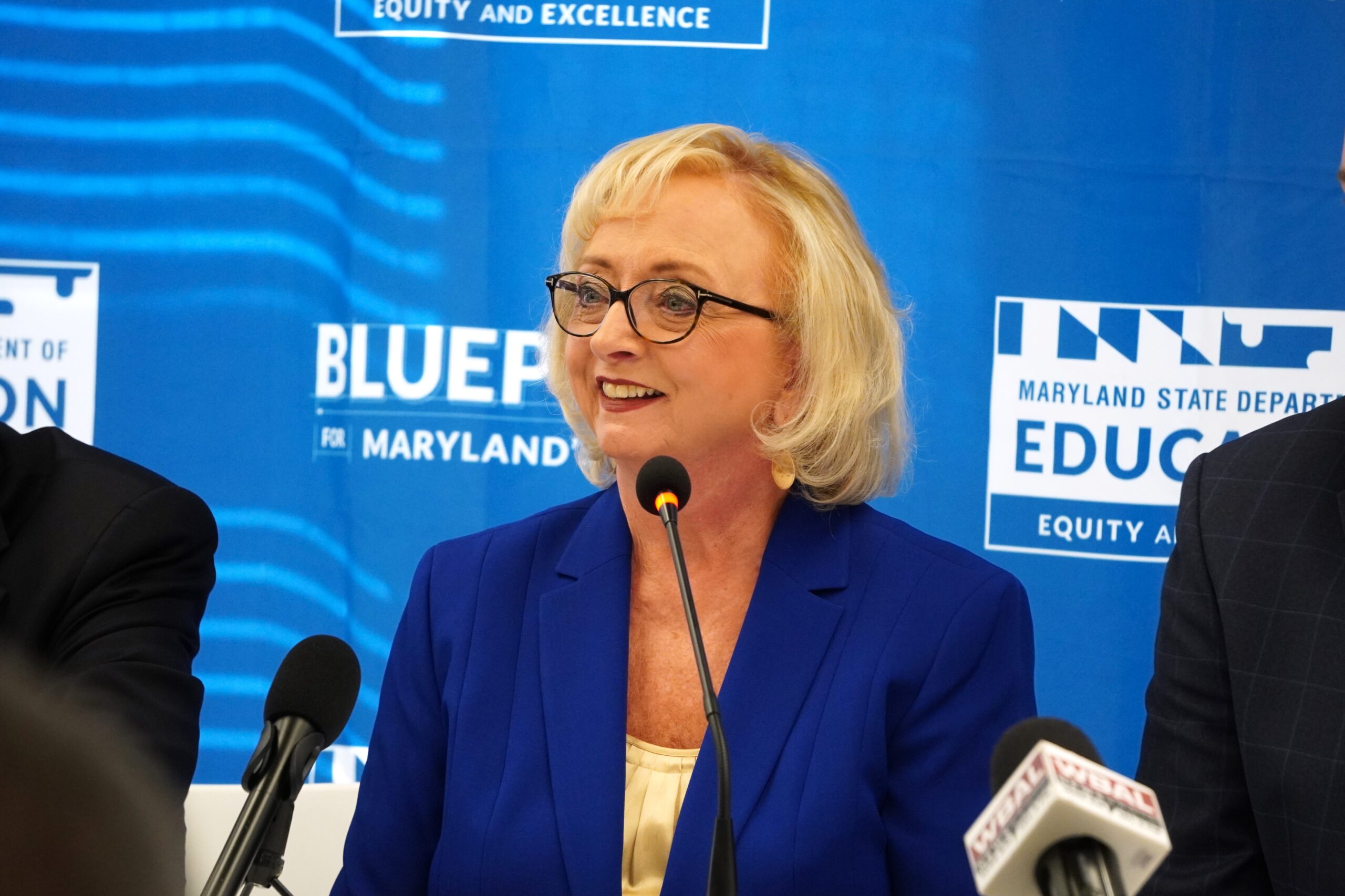Floor Report: Lawmakers Seek to Limit Possible Primary Election Delay, Introduce Russian Divestment Bill, and More

Lawmakers amended a proposed elections cost-sharing agreement to ban election officials from asking courts to push back the upcoming primary election beyond July 12 during a Tuesday morning floor session.
The amendment, introduced by Del. Jheanelle K. Wilkins (D-Montgomery), would mean that election officials wouldn’t be able to ask for an extension beyond two weeks after the currently scheduled June 28 primary election if the bill passes.
House Bill 35, introduced by Del. Julie Palakovich Carr (D-Montgomery), would codify a longstanding election cost-sharing agreement between the State Board of Elections and local boards of elections. The bill is one of the Maryland Association of Counties’ top priorities for the 2022 legislative session and has been a longstanding ask from local election officials.
“There’s so much going on with our courts as we’re figuring out redistricting that, for the voters and the sake of having a smooth election this year, that we prevent the election day as much as possible from changing by more than the two weeks,” Wilkins said Tuesday.
Republican lawmakers pushed back on the amendment after it passed on a voice vote. Del. Mark N. Fisher (R-Calvert County) said local election officials had reached out to him with concerns about the high workload they face between now and the June primary. He also criticized the congressional and legislative maps passed by the General Assembly.
“If we, the legislature, passed fair maps, we wouldn’t have court cases,” Fisher said.
Wilkins said the amendment wouldn’t prevent courts or the General Assembly from moving the primary election beyond that date, and also wouldn’t ban courts from reaching out to election officials to get information. The Maryland Court of Appeals already pushed back the candidate filing deadline for the primary election from Feb. 22 to March 22.
She said all state and local officials should be working toward the current June 28 primary date.
“Although there are court proceedings taking place, preparations should still be made for that date,” Wilkins said.
Local boards of elections face a high workload between now and the primary election, and will need final local, state and congressional maps to create precincts. Creating precincts is a street-by-street process that requires election workers to comb through the voter registration database to ensure that every registered voter is assigned to the right precinct and gets the correct ballot, David Garreis, who is Anne Arundel County’s election director and president of the Maryland Association of Election Officials, previously said.
In a February letter sent to Maryland Elections Administrator Linda Lamone, Garreis wrote that the State Board of Elections should consider moving the primary election “to a later date in 2022” in order to allow election officials more time to prepare amid ongoing litigation.
A trial in the Anne Arundel County Circuit Court for a pair of lawsuits against Maryland’s new congressional map is set to begin next Tuesday; a hearing for petitions against the state’s legislative map is set for March 22, with the special magistrate in that case aiming to submit a report to the Court of Appeals in early April; and several local maps have already been thrown out in court.
The Court of Appeals on Monday upheld a lower court decision to strike down a map drawn by the Prince George’s County Council and ordered the county to use boundaries drawn by an independent commission instead.
Baltimore County was required to submit a new map by Tuesday to the U.S. District Court in Baltimore, after a judge ruled that a redistricting plan adopted by the county council diluted the power of Black voters. As of 5 p.m., the county council had not filed a response.
“If boundary changes are made through litigation that is not resolved until mid-April, there is not enough time to implement the line changes, update the tens of thousands of precinct descriptions for precinct boundaries across the entire State, engage in a rigorous quality control process, schedule a special meeting for each Local Board to approve the new precinct boundaries, and notify voters in a timely manner, while simultaneously ensuring the regular tasks to prepare for an election are completed,” Garreis wrote.
Back to committee for stillbirth tax credit
A bill that clearly made some senators uncomfortable is headed back to committee — which may or may not be the end of the line for the legislation this year.
The bill from Sen. Sarah K. Elfreth (D-Anne Arundel) would provide a $1,000 state tax credit for any parent of a stillborn child — which by the IRS’ definition, is stillbirth when the gestation period has been 20 weeks or longer.
Elfreth said the idea came from a constituent, Lauren Petit, who lost a daughter following complications in her pregnancy in July of 2021. Parents of newborns are given tax credits, Elfreth pointed out, while parents of stillborn children incur several expenses after a fetal death, including for medical care, funeral expenses, grief counseling, and more.
Being told when she was 20 weeks pregnant that her baby would not survive was just “the beginning of the nightmare,” Petit testified before the Senate and Budget and Taxation Committee at the bill hearing in mid-February. She added that “even with excellent insurance, our family still spent nearly $8,000 on medical, funeral and grief expenses.”
Elfreth painted the bill as an act of compassion for the hundreds of Maryland families who lose children through stillbirths every year. She noted that Wisconsin and Minnesota recently provided $2,000 in tax credits for parents of stillborn children and that half a dozen other states have passed similar legislation this year.
But when the bill hit the Senate floor a week ago, it clearly confused and troubled some lawmakers, and Ferguson quickly moved to delay debate on the measure for a week. On Tuesday, Budget and Taxation Chair Guy J. Guzzone (D-Howard) moved to recommit the bill to his committee.
“We’re going to give this another look,” he said.
Asked in an interview why the bill was pulled, Elfreth replied, “It just wasn’t ready for the floor.”
It seems plausible that the bill may been caught up in the broader debate over expanding abortion rights taking place in the General Assembly right now. During the committee’s bill hearing last month, the only question was asked by Sen. Johnny Ray Salling (R-Baltimore County), an abortion rights foe, asking if the tax credit would be extended to families when a pregnant woman has an abortion. No, Elfreth replied.
Elfreth is a leading proponent of expanding abortion rights in the state, and said her bill aligned with those views.
“I’m pro-choice and I respect everybody’s choice,” she said. “If the choice is to have a baby and then it’s still-born, I want to support you.”
Asked if she thought the bill could be revived before the end of session, Elfreth said, “It’s up to the chair.”
Guzzone did not immediately respond to a request for comment on Tuesday afternoon.
‘Once a bill is introduced into the legislature, it is the legislature’s bill’
The headline is that the Senate unanimously approved a bill Tuesday that would make it easier for college students to get their academic transcripts even if they owe their colleges money for unpaid fees, parking tickets and the like.
But when it came time for the Senate to vote on the measure, the sponsor appeared as if he was almost ready to renounce it. And his public ruminations brought an indirect lecture several minutes later from Senate President Bill Ferguson (D-Baltimore City).
The bill sponsor, Sen. Benjamin F. Kramer (D-Montgomery), had taken the unusual step a few days earlier of moving to “special order” his legislation — seeking more time for final debate on the measure. Kramer told his colleagues Tuesday that he had done so because he was seeking guidance from the state attorney general’s office about amendments the Senate Education, Health and Environmental Affairs Committee had made to his bill.
The bill as originally written would have prohibited an institution of higher education in Maryland from refusing to provide a current or former student with a transcript or taking other punitive measures regarding a student’s transcript request when the student owes a debt to the institution. Kramer had buttressed his argument with a letter from the attorney general’s office noting that withholding transcripts was, in the senator’s words, “not just bad policy, but an illegal practice.”
Nevertheless, the Education, Health and Environmental Affairs Committee had amended the bill to exempt private education institutions from the edict, and decreed that the legislation would only apply to students at public universities with debts of up to $1,000 — meaning that students with greater debts to their campuses could be denied access to their transcripts.
Kramer on Tuesday said the irony with the committee’s amendments is that graduating students often need access to their transcripts in order to join the workforce and repay their debts.
“Let them have their transcripts,” Kramer said. “It’s their work.” He went on to argue that “low-income students are the ones who are harmed the greatest by this outdated provision.”
Kramer said his recent conversations with the attorney general’s office centered on the question of whether, by passing the amended bill which keeps the practice of denying certain students their transcripts because of the debts they’ve incurred, “are we codifying this practice and if it’s illegal, do we want to put it into practice as being legal?” He also expressed disappointment that private colleges could “have at it for any value, for a $25 parking ticket.”
But Kramer said he came to the conclusion that the amended bill was better than nothing, and the vote to pass the legislation proceeded rapidly and without further debate. Several minutes later, though, as the Senate was preparing to adjourn, Ferguson addressed something Kramer had said during his speech on the transcript bill — specifically his observation that it was unusual for him to seek to special order “my own bill.”
Ferguson remarked that the legislative process essentially requires lawmakers to relinquish control of their own bills and think about them in a different way once they’ve been introduced.
“A lot of times people talk about it being their bill, or my bill, or a clean bill,” he said. “Once a bill is introduced into the legislature, it is the legislature’s bill. And so it’s a really important note: Once a bill gets into a committee, it is the committee’s bill.”
Sen. Stephen S. Hershey Jr. (R-Upper Shore) attempted to inject a little levity into the conversation.
“Does this mean if a bill gets killed it’s no longer my bill?” he wondered.
Russian divestment bill introduced
At the end of Tuesday’s House floor session, Del. Brooke E. Lierman (D-Baltimore City), co-chair of the legislature’s Joint Committee on Pensions, proposed an emergency bill to divest Maryland’s retirement and pensions system from Russia.
Bills introduced within 35-days of the end of the legislative session require suspension of House rules, and lawmakers are often subject to mockery from their colleagues as they explain their tardiness on the House floor.
Each chamber has a tendency to point the finger at the other as an excuse. But not this time.
“Usually, we blame the Senate, but this time I blame Vladimir Putin,” Lierman said.
Lawmakers from both sides of the aisle chuckled — and unanimously voted to introduce the bill.
A cross-filed bill by Elfreth, the Senate chair of the pensions committee, was introduced late last month and is sponsored by the majority of the Senate chamber.






 Creative Commons Attribution
Creative Commons Attribution